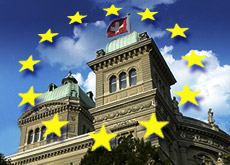Cabinet stands firm over EU accords

The Swiss government, which is negotiating a second round of bilateral treaties with the European Union, has again insisted that the nine accords be treated as a single package.
Meeting on Wednesday evening, it resisted pressure from the EU and from the eurosceptic Right to change its position.
The EU has called on Switzerland to sign an agreement on the taxation of savings as a first step towards wrapping up negotiations.
“The government reiterated its firm intention to successfully conclude negotiations with the EU,” the Federal Chancellery said in a statement on Thursday.
“But all the dossiers have to be concluded simultaneously and in such a way as to guarantee the preservation of Switzerland’s banking secrecy.”
High-level talks
The statement said the cabinet had charged the Swiss negotiating team with holding exploratory meetings with the EU aimed at preparing one comprehensive accord.
René Schwok, a professor of European politics at Geneva University, said this was an important new development.
“The government wants to organise… a meeting at the highest level,” Schwok told swissinfo.
“So for the first time in history we would have a meeting of the highest people in Switzerland and in the EU.”
He said another thing to come out of the cabinet session was the confirmation that Switzerland would have seven years to extend the agreement on the free movement of people to the countries joining the EU next month.
“It means that people from central and Eastern Europe won’t get access to Switzerland by May 1 of by January 1, 2005,” Schwok said.
Referring to splits in the cabinet over how to proceed with the negotiations, this year’s Swiss president, Joseph Deiss, said that cabinet members had agreed on a way forward despite differences of opinion.
Foreign minister Micheline Calmy-Rey said the European question was “a priority for Switzerland’s foreign policy”, but was equally important for domestic policy.
Final phase
She added that the second round of bilateral accords was entering the final phase and “could be completed in the not-too-distant future”.
“But our golden rule is: silence, we are still negotiating,” cautioned Calmy-Rey.
Schwok agreed that a deal with the EU appeared to be coming closer.
“There are good possibilities that we’ll reach an agreement by the end of this month,” he said.
Progress on the second set of bilaterals has been blocked by disputes over the taxation of EU residents’ savings in Swiss banks and the Schengen agreement governing cross-border crime.
Bern has agreed in principle to hand over tax revenues on EU residents’ savings to Brussels. But Switzerland has refused to sign an accord until the EU allows it an opt-out on certain provisions within Schengen, which the Swiss say could threaten their cherished banking secrecy.
Another stumbling block for the government has been that the two new members of cabinet – Christoph Blocher of the rightwing Swiss People’s Party and the Radical Hans-Rudolf Merz – are opposed to closer ties with the EU. This has challenged the government’s hitherto pro-EU stance.
swissinfo
A first set of bilateral agreements between Switzerland and the EU came into force on June 1, 2002.
Negotiations over a second set of bilateral agreements, including the taxation of EU residents’ savings in Switzerland and accession to the Schengen accord are continuing.
The government says it wants to deal with all nine issues as a package.
It is rejecting EU calls to deal with the thorny question of savings taxation first.

In compliance with the JTI standards
More: SWI swissinfo.ch certified by the Journalism Trust Initiative











You can find an overview of ongoing debates with our journalists here . Please join us!
If you want to start a conversation about a topic raised in this article or want to report factual errors, email us at english@swissinfo.ch.